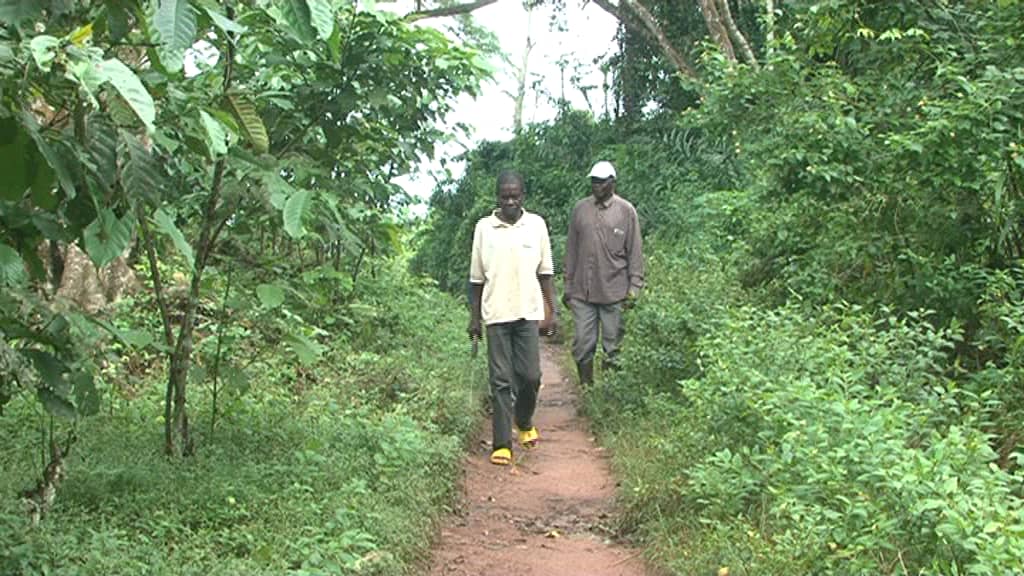|
Getting your Trinity Audio player ready...
|
Food shortages, the disappearance of medicinal plants and essences, and changes in lifestyle are the consequences of deforestation on the indigenous peoples of Central Africa.
Nearly 60 km from Douala in Cameroon, in the Littoral region, on a normal road that runs along a track that is engulfed in the forest, and out of nowhere, we enter the village Mamba lost in the middle of the forest.
Here, people live mainly from the forest and agriculture. But now the situation has changed and the consequences are being felt.
Toumé Joseph, a resident of Mamba village explains:
“I came here for the first time I was only 8 years old and my parents were comfortable. We are talking about the years 1972 to the present. Talking about the animals, they were within everyone’s reach, they came right up to the house. They came to eat palm nuts and when we came to eat game, it was within our reach.”
As for Paul, he says that when there were still a lot of trees, the soil was fertile and produced well, and the villagers ate their fill.
“When the SNC wood existed, it was the hub of life in this village. Apart from a few problems, we did not suffer. There was no lack of game meat. There was no famine. A stalk of manioc could fill a bowl, hedgehogs were not numerous. You could see that it was good, but when you come back you will find nothing, yet before the deforestation, people lived comfortably.”
Farther from Cameroon in the south of the Republic of Congo, logging has pushed indigenous peoples to find refuge in the village of Loukana, located about 6 km from the district of Sibiti in the district of Lékoumou. This relocation took place in several stages, as explained by Jean MIETE, a member of the village’s indigenous community.
“We lived in the bush quietly without complaint. The forest was the source of our livelihoods. Those relocating us to pave way for the logging business are doing so against our will and the advice of the elders who have lived here for a long time.”
The heavy exploitation of the tropical forests makes these indigenous populations fear the worst, as they are considered by many as guardians of the forests. A fear that Audrey, an indigenous inhabitant of this village, does not hesitate to talk about.
“Everything we had is already gone and the loss continues without an end to it. Everything has been destroyed and everything is almost destroyed if you want to put it that way: They have resumed cutting trees to make way for the road, even in our former village in the forest, everything has been destroyed in the bush to make way for the road.”
The situation is similar in Mbata, located in the Lobaye Prefecture, in the southern region of the Central African Republic. “In this forest area where thousands of people live, the recurrent health problems of the indigenous population are solved thanks to the traditional pharmacopeia, accessible to all and based on the roots, leaves, and bark of trees,” Paul Mamba, the camp’s chief, explains how deforestation is a danger for his people.
“All our products come from the forest. They have destroyed everything – big trees as well as small ones, we are in danger.”
The deforestation in this region of the South of the Central African Republic, due to logging companies and illegal tree cutters, is a serious handicap for the indigenous people of Mbata and its surroundings because the medical essences are destroyed putting in difficulty the traditional medicine. Odyssin is the pharmacopeia specialist in the locality and mayor of the said community. He can no longer find the necessary products for the treatment of his patients.
“You know that the forest is full of medicine. With the resources that we can get from the forest, we can have medicines. The forest is the source of everything. The companies harvesting timber are the cause of deforestation. The inhabitants of the Central African Republic who had livelihoods from the forest are bearing the negative consequences of such practices.”
Everywhere it goes, logging only brings desolation and tears instead of an improvement in the living conditions of indigenous peoples. It is therefore imperative that the authorities of these countries become aware of and act to curb deforestation due to logging that threatens everything in its path. François Medjo is an expert in Ecodevelopment in Cameroon. He draws the attention of decision-makers to the issue.
“We draw the attention of the decision-makers and the government of Cameroon to help the communities by taking this activity back into their hands, which will allow the communities to capitalize on the forestry revenues that are paid to them, notably the RFA and the social revenues. They are now victims because the destruction of the environment is enormous.”
Recent data available on Global Forest Watch revealed that the Congo Basin lost more than 600 thousand hectares of primary forest in 2020, an increase of 9% compared to 2019. Congo lost 350 KHA of primary rainforest from 2002 to 2020, or 42% of its total forest cover loss. The Central African Republic for its part has lost 169 kha of primary rainforest, or 21% of its total coverage during the same period, while Cameroon with 708 kha of primary rainforest lost, or 48%, represents more than one hundred thousand hectares of destroyed forests.
Reportage in Congo-Brazzaville by Rosie Pioth, in Cameroon by Joel Kouam, and in Central Africa by Samuel Nzam thanks to the Pulitzer Center and the Rainforest Journalism Fund






